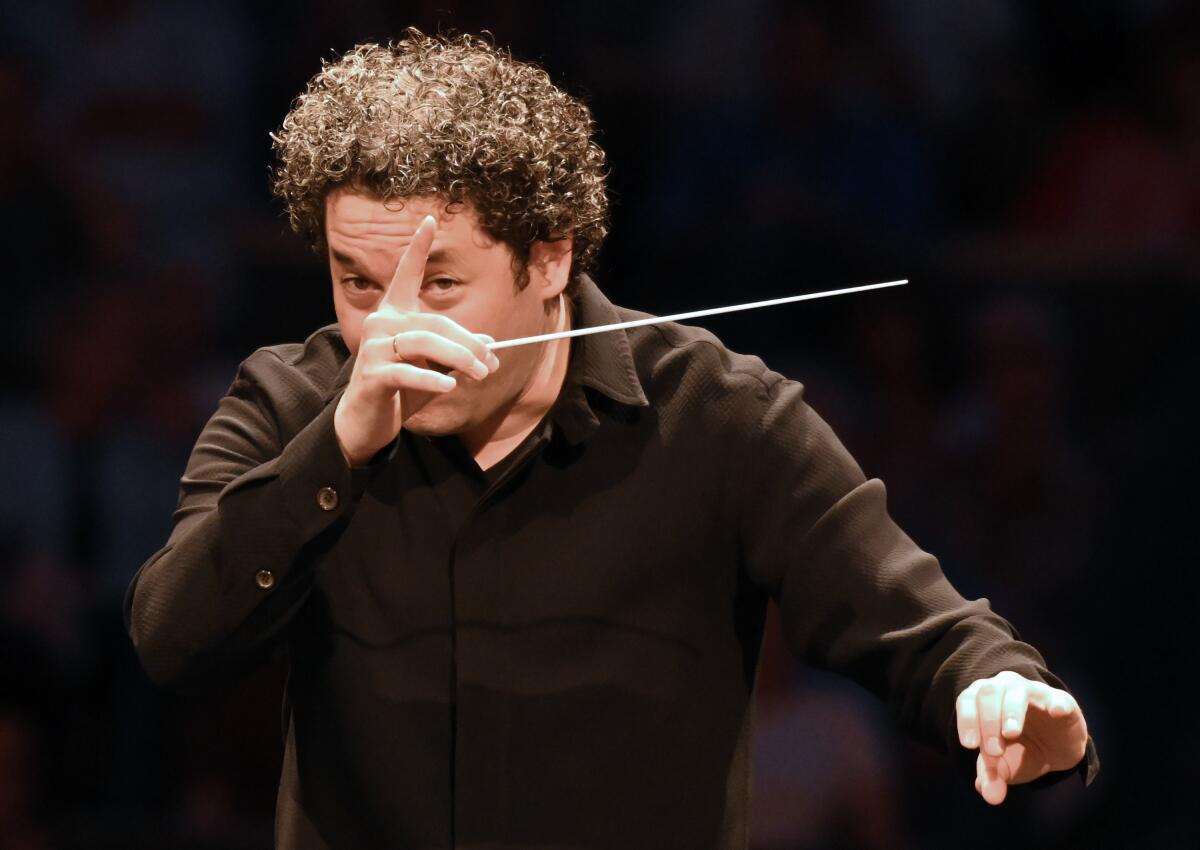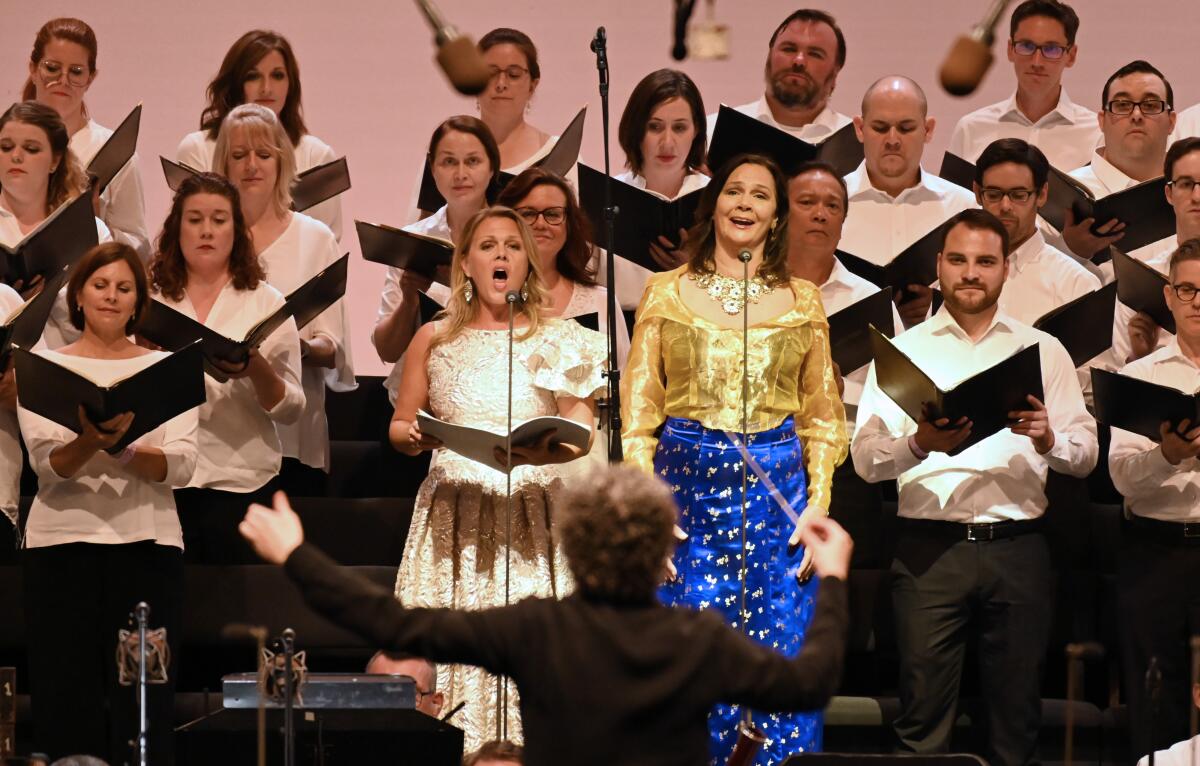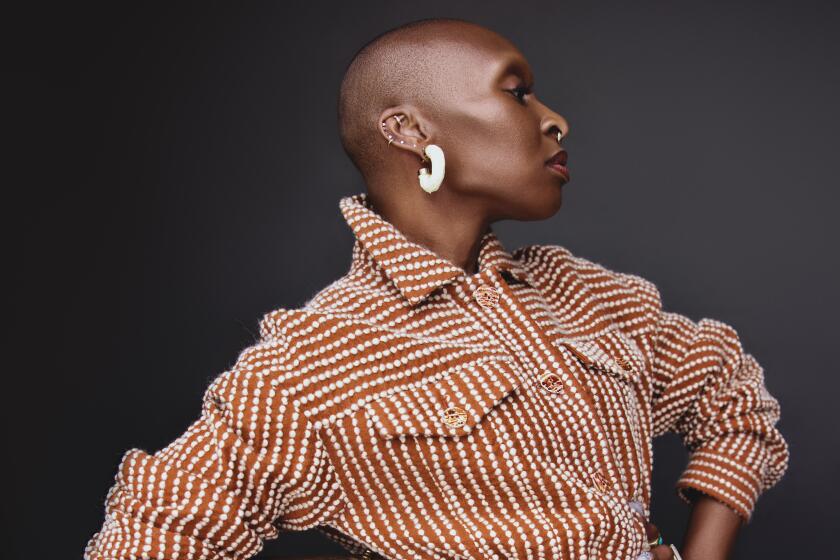Review: For Gustavo Dudamel, Mahler’s ‘Resurrection’ is no mere picnic at the Hollywood Bowl

- Share via
Though a mainstay of major orchestras, long-haul touring may well become unsustainable even in the near future. Flying more than a hundred musicians, instruments, gear and staff around the world leaves a hard-to-justify carbon footprint. The enormous expense is a drain on struggling institutions. Plus, far too often, the same old Beethoven and Brahms coals are transported to the same old New-Castle cities with their own perfectly capable orchestras.
To its credit, the Los Angeles Philharmonic, which has no fear of flying (three tours this year alone), does manage to make its presence matter. Gustavo Dudamel goes almost nowhere with the orchestra without bringing along YOLA. Nor does he play it safe or conventional.
Indeed, the Edinburgh International Festival, which happens to be including a series of “International Climate Crisis Plays” this summer, might even qualify for a few extra carbon credits by importing the far-away L.A. Phil to open the event Aug. 2. The benefit to society will include YOLA joining local under-served youth in a project. The three main orchestral programs include a free outdoor event, John Adams’ new piano concerto, “Must the Devil Have All the Good Tunes?” and Mahler’s inspiring Second Symphony.
There also happens to be a side benefit for us Hollywood Bowl stay-at-homes. The L.A. Phil can seldom get out of its Bowl obligations, but when it does, those tour programs, better rehearsed and more ambitious than what can usually be produced on the grueling summer schedule, are performed first here.
Tuesday night, we got the Mahler biggie. One of the composer’s largest symphonies, the Second (“Resurrection”) is for a sizable orchestra, chorus and two vocal soloists. It is one of the few Mahler symphonies Dudamel had yet to conduct with the L.A. Phil. When he last led it here during the epic “Mahler Project” in 2012 of all the nine completed symphonies, he used his then 175-strong Simón Bolívar band from Venezuela.
Much has changed, of course, in the past seven-and-a-half years. The Bolívars won’t be back in business until Venezuela solves its debilitating economic and political crisis. And Dudamel has matured mightily.
Just how much has changed? The 2012 Bolívar Mahler Second in Walt Disney Concert Hall lasted close to 90 minutes. Tuesday’s L.A. Phil Bowl performance was 76 minutes. The L.A. Phil had enough musicians to fill the big amphitheater stage, yet that was around a third less than the Bolívars. Both performances used the Los Angeles Master Chorale, but even it was slightly smaller — some of its members had just opened the Salzburg Festival with its Peter Sellars’ production of “Lagrime.” (Carbon or no carbon, Europe’s big festivals have a hankering for an Angeleno lift off.)
The performance was magnificent. Lost in the crush of the L.A. Phil recent hyperactivity is the fact, that with the Second, Dudamel has now conducted four Mahler symphonies this year alone, the first two and last two, including the humongous Eighth (“Symphony of a Thousand”). But pulling off a symphony like the “Resurrection” in the Bowl, even with the best of resources and intentions, is no picnic.
The Second was the full program. There was allowance for settling into the concert on a warm, ideal night for alfresco dining. Mahler meant business from the startling opening, with violins and violas in an unsettling tremolo, as though forestalling an earthquake, and the cellos and basses then jerking the malleable ground on which we sit.

Yet Dudamel and the orchestra succeeded. They created a stunned, attentive silence and one that was only broken over the course the performance by helicopters overhead (it may be time to start making some noise about that, again). The amplification can never equal the arousing acoustic authenticity of hearing Mahler in a concert hall, but this was as good as it gets outdoors. The video screens displayed Dudamel providing personality to every phrase, immeasurably helping convey meaning and hold mass attention.
The “Resurrection” is a symphonic working through pain and suffering. Death was always an audible and appreciable presence for Mahler. So was love. Nature too. Expressing what it means to hang on to what we need and what we feel in our transient existence thus became Mahler’s musical life’s work. In the Second, he helps us get past our insecurities with a symphonic spiritual road map to finding the path that makes our being born to die, and our being born to live, no contradiction.
If you don’t think we can rise up, you might change your mind by the time you reach its incomparable climax.
The youthful fervor of Dudamel’s Bolívar Second is here mostly gone. But not the promise. He conducted with harsh reality in a performance of exceptional tightness and focus, compellingly played. But sternness could also disappear in a flash, with a smile, a lilt of his head, a wave of the baton producing a sweet lyricism. In the middle movements, Dudamel added an occasional touch of humor that gave unique voice to storm clouds’ silver lining, the constant reminding of the glory of life.
Even more impressive was Dudamel‘s trust in the Bowl and his audience. He did not hesitate to let the quietest passages be next-to-inaudible against the ambient background noise of Cahuenga Pass traffic. But by straining to hear, you felt a palpable tension throughout the vast amphitheater, and the crescendo that would follow turned overwhelming, an outright realization of “resurrection,” of something coming back from the ineffable void.
The Master Chorale was, as it has conditioned us to expect, in perfect sync with Dudamel. Of the two Swedish vocal soloists, contralto Anna Larsson remained earthbound, while soprano Miah Persson soared.
More to Read
The biggest entertainment stories
Get our big stories about Hollywood, film, television, music, arts, culture and more right in your inbox as soon as they publish.
You may occasionally receive promotional content from the Los Angeles Times.











